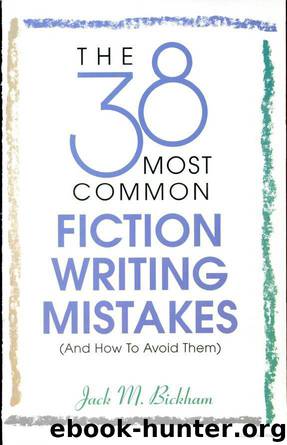The 38 Most Common Fiction Writing Mistakes by Jack M. Bickham

Author:Jack M. Bickham
Language: eng
Format: mobi, epub
Tags: Language Arts & Disciplines, Reference, Fiction - Technique, Technique, Composition & Creative Writing, Fiction, Writing Skills, Literary Criticism, Creative Writing, Authorship, General
ISBN: 9780898798210
Publisher: Writers Digest Books
Published: 1992-01-02T05:00:00+00:00
21. DON'T EVER STOP OBSERVING AND MAKING NOTES
YOU MUST NEVER STOP working on your keenness of observation. Honing your ability to observe accurately—and to write down what you've noticed—must be part of your lifelong commitment to fiction.
If you've been writing any time at all, of course, I'm sure you feel that you are an accurate observer, and a skillful writer of whatever you observe. Most of us, however, need to stand back from ourselves occasionally to make sure we haven't become lazy or passive in how we relate to the real world which is our story material.
Let me suggest a couple of simple exercises you should do carefully from time to time—not only to check up on yourself for continuing keenness of observation, but to keep your skills polished.
Look at that tree in your backyard, or in the nearby park. Really look at it. What color is it? Green? What shade of green? How is its color different from the elm nearby, or that blue spruce across the way? What shape is it? Round? Tall and graceful in the breeze, like a young ballerina, or bent with age and disease, like an old crone broken by life in the streets? How does it stand out in its surroundings? Is it tall and stark black against the eye-hurting brilliance of a summer sun? Gently fuzzy and soft in the evening twilight? Dark and frightening, casting black shadows of fear from the corner street lamp? How would you describe it in a few words, to make a picture of it leap to life in your reader's mind?
Or suppose you meet a new person today, or happen to pass a stranger on the street. Instantly you form some impression of that person. Immediately you begin to draw conclusions about what kind of person he or she is. In real life, casually, you make perhaps dozens of observations in an instant then you draw conclusions from them. For a nonwriter, such a process is automatic and unexamined. But for you the fiction writer the process must be made conscious, then examined and related to your work.
Look at that new person. Force yourself to note details actively and consciously, rather than passively and unconsciously. What details are you looking at first? Second? Only later? What details are you using as a basis for assumptions about what kind of person this is? Note body conformation, height, weight, clothing, hair, facial expression, stance, skin coloration, movement of eyes, gestures, speed of movement, age, tone of voice, loudness of voice, accent if any, intonation, speed of speaking, vocabulary. When the person begins speaking, note too what his topic may be; his characteristic attitude—whether happy, sad, angry, frightened, bitter, cynical, hopeful, trusting, whatever; note his speaking cadence, pitch and rhythms.
As soon as you can, make notes of everything you have observed. Do you note some "hole" in your observations, some detail you didn't pick up that you now wish you had? Do you find yourself wishing you could go
Download
The 38 Most Common Fiction Writing Mistakes by Jack M. Bickham.epub
This site does not store any files on its server. We only index and link to content provided by other sites. Please contact the content providers to delete copyright contents if any and email us, we'll remove relevant links or contents immediately.
Your Story Matters by Leslie Leyland Fields(1106)
Writing Children's Books For Dummies by Lisa Rojany Buccieri & Peter Economy(983)
Consider This by Chuck Palahniuk(930)
The Spooky Art by Norman Mailer(862)
0990662659 (N) by Beth Revis(860)
The Book Club Cookbook by Judy Gelman & Vicki Levy Krupp(839)
Writing Young Adult Fiction For Dummies by Deborah Halverson(821)
The Kick-Ass Writer: 1001 Ways to Write Great Fiction, Get Published, and Earn Your Audience by Wendig Chuck(737)
The Irresistible Novel by Jeff Gerke(717)
The Naive and the Sentimental Novelist by Orhan Pamuk(710)
Good Prose by Tracy Kidder(687)
The Creative Compass: Writing Your Way from Inspiration to Publication by Millman Dan & Prasada Sierra(677)
Writing from the Senses by Laura Deutsch(651)
Reading Like a Writer: A Guide for People Who Love Books and for Those Who Want to Write Them by FRANCINE PROSE(611)
The Hero Is You by Kendra Levin(588)
On Writing Romance: How to Craft a Novel That Sells by Leigh Michaels(584)
Unless It Moves the Human Heart: The Craft and Art of Writing by Roger Rosenblatt(583)
How to Write a Page-Turner by Jordan Rosenfeld(581)
Overcoming Creative Anxiety by Karen C.L. Anderson(560)
